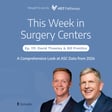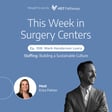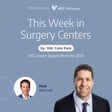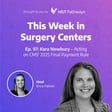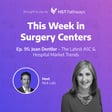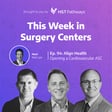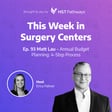Introduction to Episode
00:00:01
Speaker
Welcome to This Week in Surgery Centers. If you're in the ASC industry, then you're in the right place. Every week, we'll start the episode off by sharing an interesting conversation we had with our featured guests, and then we'll close the episode by recapping the latest news impacting surgery centers. We're excited to share with you what we have, so let's get started and see what the industry's been up to.
00:00:27
Speaker
Hi, everyone. Here's what you can expect on today's episode.
Importance of Charge Master Analysis
00:00:31
Speaker
Tara Gillen is the Chief Operating Officer at Surbin Medical Billing, and she joins our host, Nick Glatz, to talk all about the importance of performing an annual charge master analysis. We'll dive into what role the charge master plays, why it's so important to compare your current charges against your managed care contracts, and how to get started with the analysis as a whole.
00:00:55
Speaker
And then in our news recap, we'll cover the good work Blue Cross North Carolina is doing, HIPAA complaints, patient engagement technology, and of course, end the new segment with a positive story about the history being made at the University of California, San Francisco. Hope everyone enjoys the episode and here's what's going on this week in surgery centers.
Understanding Charge Master
00:01:19
Speaker
Tara, welcome to the show.
00:01:22
Speaker
Thanks so much for inviting me. It's a pleasure speaking with you. Appreciate you joining us. And let's jump right into the topic at hand. Terry, given your expertise with Surbin Medical, I thought it'd be good today and interesting for our listeners to talk about the revenue cycle and specifically hone in on the charge master today and the charge master analysis exercise in particular to start.
00:01:47
Speaker
Can you just give us a little overview of the charge master and the role it plays within the revenue cycle within an ASC setting? Absolutely. So the charge master is a list of the center's fees for the services they provide. So this is a listing of the separate charges that the ASC has developed for every procedure, supply, and service that they will perform. There are many ways to develop a charge master, and there's no one way or wrong way.
00:02:17
Speaker
in developing a charge master.
Setting Up Charge Master
00:02:20
Speaker
Most ASD's will create their first initial charge master using a percentage of Medicare reimbursement. This is because the Medicare fees are published and easily found and new surgery centers do not typically have built-in managed care fee schedules to compare to at that time.
00:02:40
Speaker
An example of this would be, you may see a brand new surgery center use a multiplier of three to four times Medicare to establish their charges. When using Medicare as your base in building a charge master, there's a few things that ASCs need to keep in mind. One is being the type of specialty or procedures that the ASC will perform. You have to understand Medicare is not an all inclusive list.
00:03:10
Speaker
And depending on the type of services, the ASC may find many of their procedures that they plan on performing not covered on the Medicare fee schedule. For example, those ASCs that plan to offer pain management spine for heavy orthopedic may encounter this more than, let's say, an eye or general surgery center. For those procedures that are not covered on Medicare, the ASC will still need to develop a charge.
Strategies for Charge Master Development
00:03:38
Speaker
The reason is just because it's not covered under Medicare does not mean that other payers will not cover the procedure or that it can't be performed in the agency. You can do this simply by looking at your market area to determine the fee, doing a little bit of research in that. The second item to understand is the facilities use of implants. Medicare does not pay separately for implants.
00:04:05
Speaker
They do, however, have a number of set procedures that they consider device intensive. This means that Medicare has rolled in the cost of the implant to the procedure fee. If the ASC does a straight multiplier of the Medicare fee schedule, including the device intensive codes, the ASC may see charges that look extraordinarily high or higher than what they anticipated.
00:04:29
Speaker
That's because Medicare rolled in that implant into that procedure cost. So you may want to consider taking the device portion out of the multiplier and just using the procedure portion. If you're a center that's going to be heavy on implants, when likely your other payers, your contracts are going to include cost of implant anyways as a separate reimbursable item. The third is always set a minimum fee.
00:04:56
Speaker
Once you run your multiplier, bump any fee that is under your minimum up to that minimum. That's the main way that most brand new surgery centers will develop a charge master. The other common way to develop a charge master is if you're existing surgery center or if you have access to managed care contracts maybe through your joint venture or something along those lines.
00:05:23
Speaker
Um, you'll run a comparison of those managed care contract fees, finding your highest reimbursable and building your charge master off of that. So for instance, you may do like one and a half, two times your blue crossroad shield to build your charge master, but you still want to. At the minimum fee, um, and bump things up to them. Yeah, that makes sense. And you mentioned that.
00:05:49
Speaker
ASCs typically, you know, have to develop their charge master when they start billing,
Annual Review of Charge Master
00:05:54
Speaker
right? When they open their doors and first start seeing patients. I want to get your experience and advice here on how often does this charge master get revisited and updated? Well, based on my experience, it rarely does. On what you should do, you should review it annually. Okay.
00:06:19
Speaker
The reason why is, you know, your contracts are gonna change depending on how your managed contracts are negotiated. They have the possibility of changing annually as well. So for instance, if you have managed care contracts that are based off of a percentage of Medicare, meaning that they're gonna pay 160% of Medicare or 210% Medicare, whatever that percentage may be, Medicare updates annually.
00:06:49
Speaker
Yep. So therefore, your negotiated rate is going to update annually. Or you have managed-care contracts that are based on a grouper rate. You may have built-in escalators into your contract, meaning that every year, your grouper rates increase by 3% or so forth for a period of times. And every year, there are new codes that are added.
00:07:18
Speaker
to where the payers go through and they reclassify code. So groupers may change throughout the year. So it's a good idea to review and analyze your charge master. Because what you will find is if you're not doing that analysis on an annual basis, you may eventually find yourself under billing, not getting the reimbursement that you expected, or deserved in an agency.
00:07:47
Speaker
Yeah, it makes sense. And from a business impact and revenue impact perspective, it certainly makes sense to me that we don't want
Reviewing and Updating Charge Master
00:07:56
Speaker
to under bill. And so it would be good practice for a center to do this on an annual basis. Can you walk me through the recommended process you'd recommend to an ASC that wants to do an annual review of their charge master? Absolutely. So typically, I love Excel, and Excel is my best
00:08:16
Speaker
So I do my analysis on Excel. So I usually keep for all the clients that I do an analysis for. I have all of the fee schedules on one Excel sheet for that client. That includes your Medicare, your workers comp, your managed care contracts, et cetera. Any payer that I have a set fee schedule for, I have it loaded on one Excel document and columns. And then I have my charge master on there as well.
00:08:47
Speaker
I'm going to have Excel pull out my highest fee for every procedure that that client does. But I'm going to analyze that against my charges. And I'm going to make sure that the charges, if they are under the highest fee, then that tells me that I need to up and do a charge master increase. That's the quickest and simplest way to do it.
00:09:17
Speaker
minutes if you have already prepped your excel document and done your loaded your fee schedules in. What you have to consider before you do a charge master increase though is that you need to really know your contracts because there are payers, payer contracts that may have limitations into increases built into their contracts. So they may limit you on a percentage that you can increase. They may limit you on
00:09:47
Speaker
time frames that you can increase. Maybe saying you can only increase every two years or so forth. And they may also have guidelines as to notifications required for your intent to increase. So really know your payer contracts before you go jump into this and do an overall increase.
Negotiation and Adjustment Pitfalls
00:10:11
Speaker
So it sounds like there's nuance in these contracts.
00:10:17
Speaker
and you really gotta get into the detail. Are there other common pitfalls? Yeah, so really the other thing you wanna consider is as you're increasing these charges is you want to, you definitely wanna increase them higher than your highest negotiated fee, but you also don't wanna increase them so high that your adjustments are through the roof.
00:10:46
Speaker
Give yourself a reasonable cushion. If you know that your contracts are mostly based off of Medicare and it's going to be a annual update, you may want to give your cushion enough to where you don't have to increase it every year, that your cushion is still going to support those changes with those contracts on a yearly basis. But don't do it so high to where your adjustments are
00:11:15
Speaker
or just through the roof. That's extremely important if an ASC decides to do contractual adjustments at payment posting instead of at billing because their AR will always reflect that gross, which is not an accurate representation of what they expect to come in because the adjustments are not calculated in. So there are a couple nuances you have to consider when you are doing these charge master reviews.
00:11:46
Speaker
Got it. That makes sense. In terms of the implications, it sounds like your recommendation is to do this on an annual basis from an implication standpoint for folks that don't do it
Consequences of Ignoring Updates
00:11:59
Speaker
that often. You mentioned underbilling because things can change. Are there any other major implications that folks need to keep in mind? Yeah. So the implications really are, like you said, the underbilling.
00:12:16
Speaker
There are, for example, the biggest indicator that a surgery center needs to review their charge master is when they start seeing payers pay 100% of their bill charge. I know that sounds great in theory, but what that means is that the payer doesn't have to take any adjustment because you are under billing their allowance.
00:12:41
Speaker
So, for instance, if your contract says that Cigna for a need procedure needs to pay you $5,000, but your charge is only $3,500, Cigna technically, all they have to pay you is $3,500, because that's what you build them. So, you really don't want to see that 100% of bill charge on these negotiated payers. That's a big indicator.
00:13:09
Speaker
What this analysis is going to show you is not only you're under billing, but let's say that you have carve outs negotiated with, let's say Aetna. And for a certain procedure, you've negotiated $11,000 with Aetna. And this charge master and this contract was created at the time the ASE opened and it's been years, it's never been updated or so forth.
00:13:34
Speaker
You did the initial analysis and negotiation based off that Medicare didn't pay for the procedure or that Medicare paid a certain amount for it or so forth. And now based off of all the CMS changes and new codes coming in and allowed procedures, Medicare now pays $11,500 for that procedure. This is gonna give you tools to be able to go back to those payers and renegotiate better rates. Fantastic. Fantastic.
00:14:01
Speaker
And so this seems like low hanging fruit, Tara, in terms of, hey, let's make sure every year on an annual basis we're going through and making sure we're not leaving dollars on the table from a revenue perspective. But ASC administrators are busy. Business managers are busy. For ASCs that need help with a process like this, what would you recommend?
Resources for Charge Master Analysis
00:14:22
Speaker
What types of companies and resources are available to help?
00:14:26
Speaker
You know, the companies that are available to help are, you know, there are revenue cycle management companies such as, you know, serving medical billing, which is who I work for. There are, you know, managed care management companies. Other than that, there's simple Excel tutorials that can make this process five, 10 minutes.
00:14:54
Speaker
This doesn't have to be a long process that will take all day and so forth. It is a very simple process once you know how to plug the formulas into Excel and it pretty much does all the work for you. Fantastic. You mentioned RCM companies can help with services like this and within the RCM provider sweet spot.
00:15:21
Speaker
Can you tell us just a little bit about Serbin Medical and specifically kind of how you guys position your services within the overall ASC-RCM space? Sure. So Serbin Medical Billing, we kind of bill ourselves as a concierge ASC billing and revenue cycle service. We offer a very personalized package to our clients that goes beyond just coding and billing for the ASC.
00:15:50
Speaker
We act as an extension of their business office and assist in navigating various hurdles such as charge master analysis that the ASC may encounter in the revenue cycle process. So we kind of look at ourselves as partners with the ASC to offer those unique and personalized services. Fantastic.
00:16:18
Speaker
And last question for you here today, Tara, and we do this every week with our guests. What is one thing our listeners can do this week to improve their surgery centers? Charge Master Analysis. It really is truly a very simple process to do. I know it sounds scary and it sounds big, but it truly is not. And it will really head your facility into the right path for 2020.
00:16:47
Speaker
to get that information that you need. And like you said, it's low-hanging fruit, but it's quick, low-hanging fruit. That's the kind of low-hanging fruit we like the best. Tara, thanks so much for joining us today. I appreciate it. Thank you very much.
00:17:06
Speaker
As always, it has been a busy week in healthcare, so let's jump right in.
Community Initiatives in Healthcare
00:17:11
Speaker
Our first story comes from Med City News, and they're sharing some heartwarming news from Blue Cross, North Carolina.
00:17:18
Speaker
Due to fewer employees working on site, their cafeteria is seeing less and less activity and remains relatively empty. So they saw this as an opportunity and decided to use the cafeteria to prepare meals and then distribute them to more than a dozen nonprofits in the area, which then provide the meals to those in need to their communities.
00:17:41
Speaker
North Carolina actually has 1.6 million households that don't have enough food, so their work will make a huge difference to this community.
00:17:52
Speaker
And the Payers onsite meal delivery program has already shared some impressive numbers. About 3,400 meals were distributed in January, and they hope to distribute another 4,200 in February. Now, what started off as a temporary winter program, that's kind of what they called it,
00:18:12
Speaker
It was only supposed to run for three months and it is still set to end on March 31st, but they're thinking they might continue on long-term. They're currently evaluating if it's something that they can continue with, and I think we can all hope that they do.
HIPAA Challenges and Breaches
00:18:27
Speaker
According to an article from Healthcare Dive, the HHS Office for Civil Rights, or OCR, received 39 more HIPAA complaints in 2021 than they did from 2017.
00:18:40
Speaker
and large breaches affecting 500 people or more increased 58% in that same time period. This information was shared in the agency's annual report to Congress, along with the unfortunate reality that while complaints have increased within that four-year time period, the staffing and resources have not, which is obviously causing a severe strain on existing employees.
00:19:04
Speaker
The article did share a few examples of investigations that the OCR did have the resources to follow up on, and one that caught my eye was from January 2021 when Excellus agreed to pay $5.1 million after an investigation revealed poor cybersecurity practices,
00:19:25
Speaker
that led to a data breach of the PHI of more than 9.3 million patients. So at a time where cybersecurity attacks on the healthcare industry are becoming more and more common, the agency that is supposed to be there to help protect patients and keep healthcare facilities in line
00:19:45
Speaker
is not properly staffed or funded to do so at the volume that is needed. So as always, the moral of the story is to invest in your cybersecurity measures, educate your staff, and just always err on the side of caution.
Tech Solutions in Patient Communication
00:20:01
Speaker
Our next story is all about the potential of technology when it comes to patient engagement and the patient experience.
00:20:10
Speaker
The Ohio Gastroenterology Group was averaging about 50,000 phone calls per month from patients, and it became nearly impossible for them to handle. Patients were calling for every little thing, looking for information on time, the address, parking, clinical concerns, and anything else that came up. They had no way else to reach out to them except for picking up the phone.
00:20:36
Speaker
They really needed a solution to overcome this huge time suck and it was also causing patient dissatisfaction because they couldn't get a hold of anyone and had to leave voicemails and it just wasn't working. They decided that they needed a change and they decided to roll out a few initiatives. The first is they plan to gradually implement text messaging, email, and mobile apps to take over that patient communication.
00:21:04
Speaker
The second is to provide richer more helpful information on their website so patients i feel like patients would prefer most patients to go to a website find their own information.
00:21:15
Speaker
real quick than having to wait on hold and leave voicemails and stuff. So highly recommend that if you haven't taken a look at your website, make sure that you're providing as much helpful information as you can. But back to the Ohio Gastro Group. Along the same lines as the two initial initiatives that they're working on, the third is to implement a smart virtual assistant that will be powered by conversational AI
00:21:41
Speaker
on their website through text and also voice. And then they're also working on implementing referral scheduling functionality that enables patients to book appointments digitally and online without having to pick up the phone.
00:21:54
Speaker
So I highly recommend giving this article a read. What I shared is just really the tip of the iceberg of what this group is doing. And it actually really lays out a full action plan of how healthcare groups, regardless of their size, can roll out technology in an effective way. The reality is if you're not using patient engagement technology, you're missing out on a ton of automation and time savings on your end.
00:22:18
Speaker
And you're also not providing the preferred patient experience. So I think, you know, while it can seem overwhelming, this article does do a great job of showing a very real situation where a facility was able to roll out patient engagement technology successfully.
Breaking Gender Norms in Surgery
00:22:38
Speaker
And to end our new segment on a positive note, doctors made history at the University of California, San Francisco, when for the first time ever, a heart transplant was performed by an all women medical team. A 2019 report found that only 6% of adult cardiac surgeons in the US are women.
00:22:58
Speaker
So that's what really made this stand out. The odds that all seven members of the team were women is extremely rare. So Dr. Amy Fidler, attending cardiac surgeon and assistant professor said that it is profound to think that by doing our jobs, we can inspire women to live what they want to do, live out their dreams, and recognize that anything is possible.
00:23:23
Speaker
And that news story officially wraps up this week's podcast. Thank you as always for spending a few minutes of your week with us. Make sure to subscribe or leave a review on whichever platform you're listening from. I hope you have a great day and we'll see you again next week.


